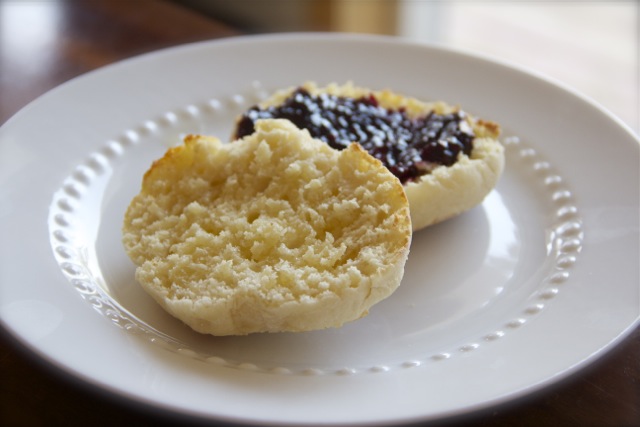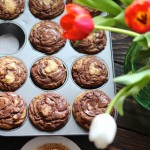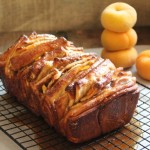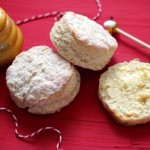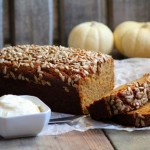It’s English Muffin Week at Alaska from Scratch! Every post this week will feature the ever-popular household bread, beginning with a tried and true from scratch recipe for basic English Muffins.
I’ve tried a few homemade English muffin recipes since moving to Alaska and I’m pleased to announce after months of experimentation that I’ve landed on one that is good enough (nay, great enough) to share with all of you, full of all those airy nooks and crannies we all hope for. If you take a gander at the dough (pictured above) you can spy many large air bubbles. That’s exactly what you need to achieve perfect, classic English muffins.
The trick is to take that sticky, loose, airy dough and dust it enough on both sides with flour and cornmeal to just be able to work with it. Pat it out very lightly so as not to lose all of the all of the nook and cranny magic. No kneading at all. Cut them with a biscuit cutter and place them directly into a hot skillet.
Then, just watch the wonder of it all as the muffins puff up beautifully and turn crisp and golden on both sides. Give them a quick finish in a 400 degree oven to make sure they’re cooked through and then split them with a fork…
The appearance and texture of these muffins is just like store-bought, but they taste even better, with that fresh, homemade bread taste you can’t buy. Toast them well until they’re golden and crisp then get some butter melting into those little crannies pronto. Jam or honey optional. Stay tuned all week for even more ways to use your homemade English Muffins.
English Muffins
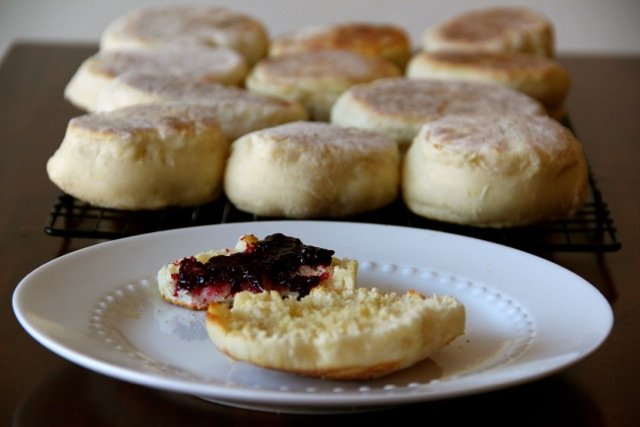
Adapted from [Michael Ruhlman|http://ruhlman.com/2010/12/english-muffins-recipe/]
Yields: one dozen muffins
- ¼ cup butter, melted
- 1 tablespoon sugar
- 2 cups milk, warmed to about 110 degrees
- 1-½ teaspoons active dry yeast
- 1 large egg, beaten
- 4 cups flour (fluffed, loose cups of flour as opposed to pressed and leveled off)
- 1-½ teaspoons salt
- 2 teaspoons baking powder dissolved in 1tablespoon of hot water
- cornmeal and flour for dusting
In the bowl of a stand mixer fitted with the dough hook attachment, stir melted butter, sugar, and warm milk together until sugar is dissolved (I stirred this by hand with a spoon, not with the dough hook). Add yeast and beaten egg and stir to combine.
Sprinkle the flour over the top of the milk mixture, followed by the salt and baking powder/water mixture. Knead with the dough hook until a sticky, elastic dough forms, being sure to scrape the sides and bottom of the bowl. Dough is meant to be loose and sticky; you may be tempted to add more flour, but don't.
Cover the bowl with a kitchen towel and allow to rise in a warm place for 90 minutes - 2 hours. The dough should be well-risen and full of air bubbles.
Heat a large skillet over medium heat. Have a biscuit cutter ready.
Preheat oven to 400 and have a sheet pan ready.
Dust your work surface generously with cornmeal and flour. Gently pour your risen dough onto the work surface, being careful not to knead or stir. Dust top of dough with cornmeal/flour until it's not sticky. Gently pat the dough out into a circle about 1-1.5 inch thickness. Use the biscuit cutter to cut your muffins. Carefully pick them up and place them promptly into the hot skillet.
When the muffins are golden and firm on the bottom, after 2-3 minutes, flip. Cook another 2-3 minutes, then transfer them to the baking sheet. Continue cooking muffins in batches.
Finish the muffins in the oven for 5 minutes. Remove to a cooling rack.
Split with a fork (if you use a knife you won't get the same nook and crannies effect). Store in a bag.
